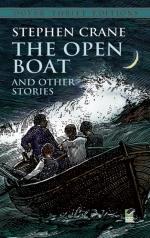|
This section contains 3,591 words (approx. 12 pages at 300 words per page) |

|
SOURCE: Kent, Thomas L. “The Problem of Knowledge in ‘The Open Boat’ and ‘The Blue Hotel’.” American Literary Realism 14, no. 2 (autumn 1981): 262-68.
In the following essay, Kent analyzes the ways Crane creates epistemological uncertainty in “The Open Boat” and “The Blue Hotel.”
Stephen Crane's fiction, especially his short fiction, has undergone in the past two decades a major revaluation. Crane is no longer considered a pure naturalist in the tradition best represented by Garland and Norris; rather, he is now regarded as one of the first American existentialist writers, one who was vitally concerned with the epistemological problem of man's ability to know his place in the universe. Donna Gerstenberger, for example, argues that “The Open Boat” “May best be viewed as a story with an epistemological emphasis, one which constantly reminds its readers of the impossibility of man's knowing anything, even that which he experiences.”1 But though...
|
This section contains 3,591 words (approx. 12 pages at 300 words per page) |

|


